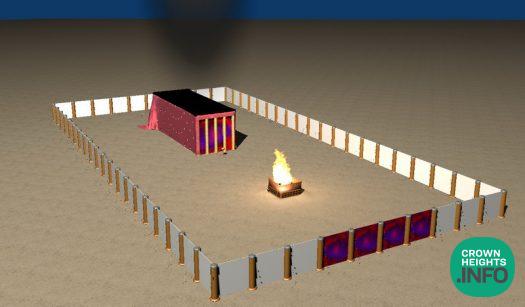
Weekly Dvar Torah: Moshe Gathers The Jews
ויקהל משה את כל עדת בני ישראל.
Moshe gathered all the Yidden to tell them all about the Mishkan, the Tabernacle, where the Jews will build a house for Hashem.
He is going to tell them all about the donations necessary and all the materials required for the Mishkan, he is going to tell them what the Mishkan will consist of, the structure and all the vessels needed in order to serve G-d properly in His house.
Guess what, the first sentence is all about keeping Shabbos.
What does Shabbos got to do with building the Mishkan?
Rashi explains, that Moshe wanted to inform the Jews that even when they are building Hashems house, and what could be more important than that, nevertheless, as excited as you may feel about this most important project, you cannot build this house on Shabbos.
Before you build a house for Hashem, it is more important to obey His commandments, to keep Shabbos and refrain from doing any physical work on Shabbos, even at the expense of delaying the building of G-d’s house.
Chassidus explains that the Mishkan was meant to be the dwelling place of G-d.
ועשו לי מקדש ושכנתי בתוכם, בתוכו לא נאמר אלא בתוכם, בתוך כל אחד ואחד.
And they should make me a dwelling place, and I will dwell in them.
G-d does not say I will dwell in it, in this structure that you will build, G-d says I will dwell in them, meaning in each and every one of them, in each of the Jewish people.
When Moshe instructs the people to prepare themselves to become a home for Hashem, the expected reaction of a Jew is do something most appropriate to identify with G-d.
There are three basic tools with which a person can express himself, thought, speech and action.
At first glance, the most spiritual method is thought, to meditate on G-d, less spiritual but not completely physical, is to speak about G-d, to say G-dly words, to raise oneself above materialism, to be elevated and removed from physical distractions.
What I do physically should have no effect on my relationship with G-d, what difference could it make what I eat or what I do? My mundane physical activity should have no bearing on my relationship with G-d.
Therefore, the first sentence about the Mishkan starts with the command to keep Shabbos, to remind us that as lofty and special building G-d’s house can possibly be, it does not supersede obeying G-d’s instruction of how to act physically.
And most importantly, it comes to remind us that what we do does matter, because G-d wants His dwelling place to be in this physical world, therefore what we do physically matters most.
G-d could have built His home in the spiritual worlds, there He has angels, holy spiritual beings who will worship Him without distractions or any interruptions, what could be better than that?
But G-d said no, I want My home to be in this mundane world, inside people who have encounters with their physicality, people who need to work hard at resisting all kinds of everyday challenges to welcome Me within them, so what they do physically is what matters most.
Don’t get carried away with your lofty spiritual trips, I need you to simply do what I ask, because this is how I get My home amongst you, inside you, what you do or don’t do in real physical action, is what makes My house.
Get working on preparing a sumptuous Shabbos before Shabbos comes in, so G-d can enter His house inside you.
Have a G-dly restful Shabbos,
Gut Shabbos
Rabbi Yosef Katzman










